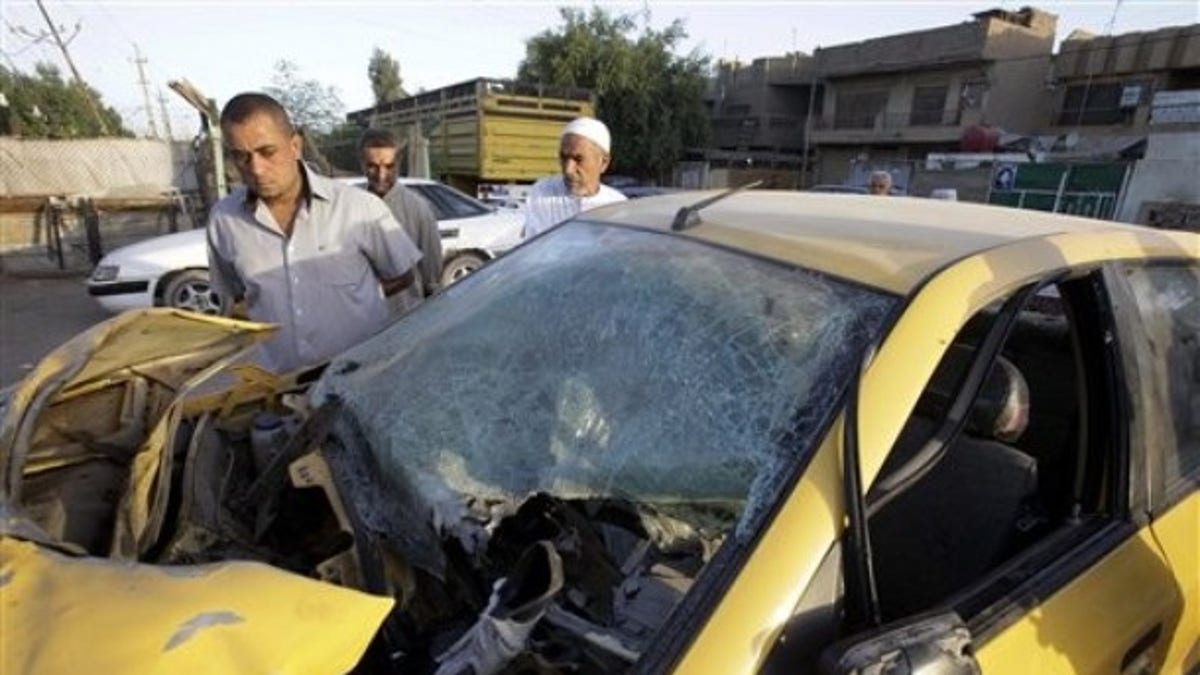
Friday: People inspect a damaged car at the scene of a bomb attack in Baghdad, Iraq. Two explosions on Thursday night in Sadr City neighborhood killed and wounded scores of people, police said. (AP)
Iraq faces a greater risk of renewed violence if U.S. forces are told to leave Iraq, top U.S. lawmakers warned Sunday as the White House insisted negotiations to keep some U.S. troops in Iraq haven't been abandoned even though Iraqi officials remain adamant they not get immunity if they remain.
As the clock ticks down to a Dec. 31 withdrawal of U.S. troops from Iraq, both sides say they want U.S. forces to stay in Iraq in training and peacekeeping capacities.
But a senior government official in Iraq told Fox News on Sunday that all Iraqi political blocks agree U.S. troops should not have immunity from prosecutions for killing Iraqi civilians or others if they stay beyond 2011. That's a deal breaker for the Pentagon.
"The Iraqi government welcome the training for its security forces without providing them immunity as per the decision of all political blocks in Iraq," Ali al Dabbagh, a government spokesman told Fox News.
"Iraq and (the) USA collectively are looking for any other options which will make the training mission doable," he said.
Negotiations are ongoing, however, as the White House denied late Saturday an Associated Press report that the administration had decided to pull almost all U.S. troops -- save about 160 who would remain to be military trainers assigned to the State Department's Office of Security and Cooperation.
"President Obama has repeatedly made it clear that we are committed to keeping our agreement with the Iraqi government to remove all of our troops by the end of this year," said National Security Council spokesman Tommy Vietor.
"At the same time we're building a comprehensive partnership with Iraq under the Strategic Framework Agreement including a robust security relationship, and discussions with the Iraqis about the nature of that relationship are ongoing," Vietor said.
Sen. Dianne Feinstein, D-Calif., chairwoman of the Senate Intelligence Committee, told "Fox News Sunday" that without a Status of Forces Agreement, the U.S. cannot leave troops in the country against the will of the government. But, she said, she is troubled by the potential for a complete pullout of the 44,000 troops now in the country, citing Korea as an example of how it could take years for Iraq to achieve self-sustaining stability.
"I think people are so anxious for men and women to come home," she said. "I understand that, it is also important that the job is completed in a way that provides the greatest chance for stability for the country. I think that is a key goal for Afghanistan as well as Iraq. So I am hopeful that they will be able to quickly negotiate a Status of Forces Agreement. Absent that, yes, we'll have to bring our people home."
Sen. John McCain, R-Ariz., the ranking Republican on the Senate Armed Services Committee, said among the biggest strategic and security threats of a complete pullout is the opportunity for Iran to penetrate Iraq, as it is already trying to do in southern Iraq, and the possibility of destabilization and sectarian violence.
McCain said the U.S. should leave behind about 13,000 troops.
"The fact is that there (are) very volatile areas between the Kurdish areas in Iraq in the north that needs peacekeeping forces. They need technical assistance on intelligence. They need help with their air assets, which they have literally none," McCain said. "And this has been terribly mishandled in my view by the administration."




